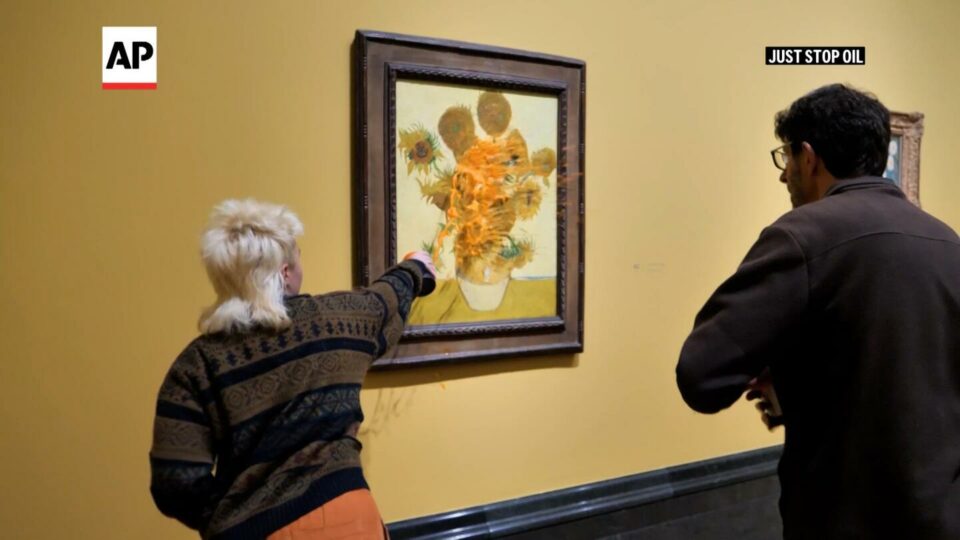What was the motivation behind the climate activists‘ protest targeting Van Gogh’s Sunflowers artwork?
London Gallery Targeted Again: Climate Activists Take Aim at Van Gogh’s Sunflowers with Soup
London’s prestigious art gallery, the National Gallery, was once again at the center of controversy this week as climate activists staged a unique protest targeting one of the most beloved artworks in its collection – Vincent Van Gogh’s Sunflowers. Protesters threw soup at the painting to draw attention to the impact of climate change on agriculture and the environment. This bold and unconventional act has sparked debates about the role of art in raising awareness about climate issues and the responsibilities of galleries in responding to these protests.
Impact of the Protest
The targeted protest at the National Gallery has once again highlighted the growing intersection of art and climate activism. The act of throwing soup at Van Gogh’s Sunflowers has brought attention to the environmental impact of modern agricultural practices, with activists arguing that climate change is causing significant disruptions to the natural world, as depicted in the artist’s iconic piece.
The dramatic event has also raised important questions about the appropriate response from art institutions to such protests. While the National Gallery has condemned the act as vandalism, it has also sparked meaningful discussions about the role of art in addressing pressing global issues and the importance of engaging with diverse perspectives within the art world.
Climate Activism and Art
The use of art as a platform for advocacy and protest is not a new phenomenon. Throughout history, artists have used their work to shed light on social and environmental issues, from the works of the Pre-Raphaelites drawing attention to industrialization to protest art responding to political strife and conflict. Climate activists are increasingly turning to art as a means of drawing attention to the urgent need for environmental action.
Recognizing the power of art in shaping public opinion and sparking conversations, climate activists have utilized various creative methods to raise awareness about climate change. From large-scale public art installations to disruptive protests in art spaces, activists are leveraging the cultural significance of art to amplify their message and engage new audiences.
The Role of Galleries
In response to the recent protest, the National Gallery has emphasized the need to protect the integrity
On Friday, a group of climate activists made headlines once again by throwing soup over Vincent van Gogh’s iconic painting “Sunflowers” at London’s National Gallery. This bold action was carried out by three members of the Just Stop Oil movement in response to the recent sentencing of two British climate activists who had previously defaced the same painting with tomato soup in 2022. This earlier incident nearly resulted in the destruction of one of van Gogh’s most cherished masterpieces.
The repeated targeting of “Sunflowers” by these environmental activists underscores the growing concern and urgency surrounding climate change and its impact on art and cultural heritage. The use of such a widely recognized painting as a platform for protest draws attention to the intersection between environmental activism and the preservation of artistic treasures.
While some may view these actions as controversial or even destructive, they have succeeded in drawing widespread attention to both the ongoing threat posed by climate change and the need for greater action to address it. By targeting a symbol as universally revered as van Gogh’s “Sunflowers,” these activists have effectively brought their message to millions around the world.
This latest incident serves as a stark reminder that urgent action is needed to protect our planet and its precious resources, including works of art that hold immeasurable cultural value. As we witness more frequent extreme weather events, rising sea levels, and other alarming signs of environmental deterioration, it is clear that we must all take responsibility for safeguarding our environment for future generations.
In light of this recent display at London’s National Gallery, it is evident that public awareness about climate change is reaching new heights. It remains crucial for individuals, organizations, and governments worldwide to collaborate on meaningful solutions that will mitigate this global crisis before irreparable damage occurs.
As we move forward into an uncertain future shaped by climate change, incidents like these should prompt us all to consider how we can contribute positively toward preserving our natural world while advocating strongly for necessary changes in policy and behavior. The fate not only of iconic artworks like “Sunflowers,” but also our entire planet depends on our collective willingness to take swift action against environmental degradation.
It becomes increasingly clear with each passing day that preserving ecological balance goes hand-in-hand with protecting humanity’s most cherished achievements – be they artistic or otherwise – from imminent peril caused by unchecked ecological decline.


